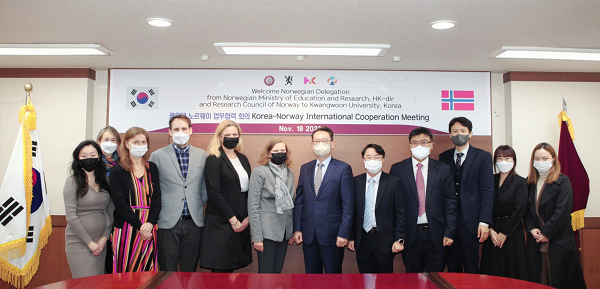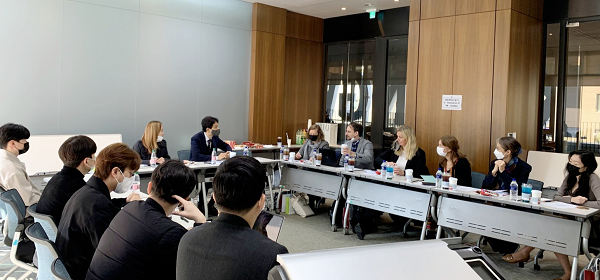Six Science and Technology Exchange Delegations Visited Kwangwoon University
- admin
- 2022-11-29
- 5793
Six Science and Technology Exchange Delegations
Visited
Kwangwoon University to Discuss Cooperation on Next-Generation Extreme Semiconductors
and Energy Materials
On the 18th,
a delegation of 6 national science and academic and field representatives,
including officials from Norwegian higher education policy and research
consultative government agencies and officials from the Royal Norwegian Embassy
in Korea, visited Kwangwoon University. They discussed research cooperation and
academic exchange plans between Kwangwoon University and Norwegian
universities.
Kwangwoon University President Kim
Jong-heon, Director of Industry-University Cooperation Park Chul-hwan, Dean of
Academic Affairs Seok-jae Jeong, Dean of International Affairs Han Jae-hyeon,
Director of High Energy Gap Semiconductor Research Center Ku Sang-mo, Professor
Kim Min-gyeong of Electronic Materials Engineering, etc. attended the meeting.

The
Norwegian delegation visited Kwangwoon University as a representative
university for science and technology cooperation in the Seoul region during
their official visit to Korea from the 14th to the 18th. The entire delegation
visited Kwangwoon University to expand research cooperation and exchanges with
Kwangwoon University in the fields of next-generation extreme cold
semiconductors and energy. The Norwegian delegation included Hilde
Haaland-Kramer, Head of International Relations, Vegard Furustøl Vibe, Advisor,
Tone Flood Strøm, Senior Advisor, Ministry of Education, National Studies,
National Higher Education Council; The Council consisted of key figures such as
Marianne Jensen, Chief of Staff, Special Advisor Aleksandra Witzcak Haugsta,
and Consul Christine Mee Lie of the Royal Norwegian Embassy in Korea.
Norway is an energy powerhouse with abundant
oil, natural gas, and marine and fisheries resources, investing in more than
9,000 global companies worldwide. Norway's sovereign wealth fund has declared
that it will achieve carbon neutrality "Net Zero" by 2050. It owns 70
state-owned companies in 12 ministries with an ownership value of about 170
trillion won. Norway is showing high interest in energy and next-generation
extreme semiconductor technology, such as replacing all taxis with electric
vehicles and promoting the installation of wireless charging roads.
Hilde Holland-Kramer, head of the delegation,
said, “We are aware of the importance of expanding cooperation in science and
technology fields where Kwangwoon University is strong, such as next-generation
extreme semiconductors, batteries, and AI. I hope that through this
opportunity, direct cooperation and people-to-people exchanges with Norwegian
institutions and Kwangwoon University in the field of science and technology
will be expanded.”
Park Cheol-hwan, head of industry-university
cooperation, said, “Norway is an oil-producing country, but 97% of its total
electricity is obtained through renewable energy such as hydropower and wind
power. Mentioning that it has developed into a world-leading country in the
energy field, such as having the world's third-largest electric vehicle market.
I hope that this visit will serve as a cornerstone for active exchanges between
Kwangwoon University and Norwegian universities and research institutes in
areas such as extreme semiconductors, energy, and AI-ICT.”
President Kim Jong-heon introduced
the ICT-based school in the era of hyper-convergence and said, “I hope it will
serve as an opportunity to strengthen international cooperation, including
research cooperation and student exchanges in Kwangwoon University’s major
science and technology research fields, such as next-generation extreme
semiconductors, energy, and AI.”

An academic exchange workshop was held through the meeting that followed. Researchers from Kwangwoon University, including the head of the High Energy Gap Semiconductor Research Center (Professor Koo Sang-mo, Department of Electronic Materials Engineering), who are conducting cooperative research with the University of Oslo, and the Norwegian delegation, are seeking ways to cooperate, and the Norwegian science and technology internationalization policy and Korea have recently become a priority country. In the framework of the Panorama Strategy included, in-depth discussions were held on further advanced cooperation in the future.